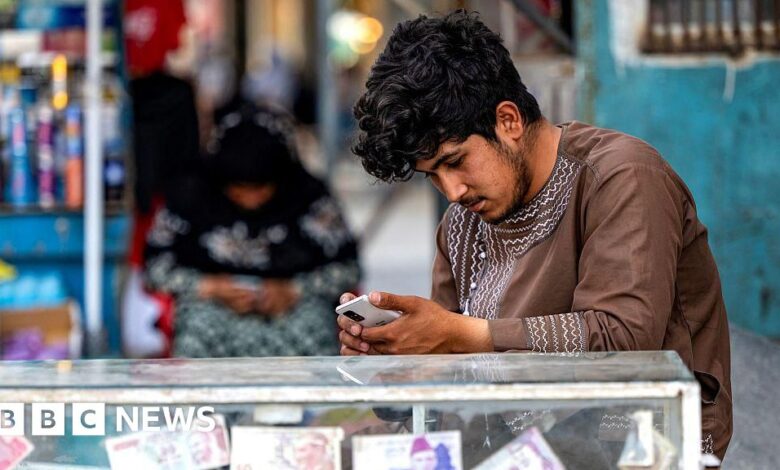Afghanistan sees telecom shutdown as Taliban cut off internet

The Taliban government in Afghanistan has imposed a nationwide shutdown of telecommunications, weeks after it began severing fibre-optic internet connections.
The country is currently experiencing a “total internet blackout”, internet watchdog Netblocks reports.
International news agencies say they have lost contact with offices in the capital Kabul. Mobile internet and satellite TV has also been severely disrupted across Afghanistan.
The Taliban have yet to give an official reason for the shutdown. Since seizing power in 2021, the Taliban have imposed numerous restrictions in accordance with their interpretation of Islamic Sharia law.
A Taliban official said the telecom shutdown would last until further notice.
Tolo News, a privately owned Afghan news channel, told people to follow its social media pages for updates as it expected disruptions to its television and radio networks.
Flights from Kabul airport have also been disrupted, local media reported.
According to Flight tracking service Flightradar24, at least eight flights scheduled to depart from or arrive at Kabul International Airport on Tuesday have been cancelled.
Several people in Kabul have told the BBC that their fibre-optic internet stopped working towards the end of the working day, around 17:00 local time (12:30 GMT)
Because of this, it is understood many people will not notice the impact until Tuesday morning, when banking services and other businesses are due to resume.
Fibre-optic cables transfer data super fast, and are used for much of the world’s internet.
In a post on social network Mastodon.social, Netblocks said:
“Afghanistan is now in the midst of a total internet blackout as Taliban authorities move to implement morality measures, with multiple networks disconnected through the morning in a stepwise manner; telephone services are currently also impacted”.
For weeks internet users in several Afghan provinces have been complaining about either slow internet access or no connectivity.
The Taliban earlier said an alternative route for internet access would be created, without giving any details.
Business leaders at the time warned that if the internet ban continued their activities would be seriously hit.
Hamid Haidari, former editor-in-chief of Afghan news channel 1TV, said after the shutdown that “loneliness enveloped the entire country.”
“Afghanistan has now officially taken first place in the competition with North Korea for [internet] disconnection” he said on X.
“The silence online without Afghan voices from inside Afghanistan is deafening,” Mariam Solaimankhil, a former member of Afghanistan’s parliament now based in the US, wrote in a post tagging X owner Elon Musk.
The blackout is the latest in a series of restrictions which the Taliban have enforced since returning to power.
Earlier this month they removed books written by women from the country’s university teaching system as part of a new ban which has also outlawed the teaching of human rights and sexual harassment.
Women and girls have also been particularly hard-hit: they are barred from accessing education beyond the age of 12, with one of their last routes to further training cut off in late 2024, when midwifery courses were quietly shut down.
The Taliban retook control of Afghanistan in 2021 in a lightning advance, weeks after the withdrawal of US and other international forces.
Source link

